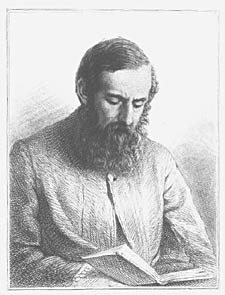Readings:
1 Chronicles 21:1-13
Psalm 9:11-20
1 Peter 4:12-19
Mark 8:34-38Preface of Holy Week
[Common of a Martyr]
[Common of a Missionary]
[Common of a Pastor]
[Of the Holy Cross]
[For the Ministry II]
[For the Mission of the Church]
PRAYER (traditional language) Almighty God, who didst call thy faithful servant John Coleridge Patteson and his companions to witness to the gospel, and by their labors and sufferings didst raise up a people for thine own possession: Pour out thy Holy Ghost upon thy church in every land, that, by the service and sacrifice of many, thy holy Name may be glorified and thy kingdom enlarged; through Jesus Christ our Lord, who liveth and reigneth with thee and the Holy Ghost, one God, for ever and ever. Amen.
PRAYER (contemporary language)
Almighty God, who called your faithful servant John Coleridge Patteson and his companions to witness to the gospel, and by their labors and sufferings raised up a people for your own possession: Pour out your Holy Spirit upon your church in every land, that, by the service and sacrifice of many, your holy Name may be glorified and your kingdom enlarged; through Jesus Christ our Lord, who lives and reigns with you and the Holy Spirit, one God, for ever and ever. Amen.
Lessons revised at General Convention 2024
Return to Lectionary Home Page
Webmaster: Charles Wohlers
Last updated: 21 July 2024
JOHN COLERIDGE PATTESON,
BISHOP OF MELANESIA, AND HIS COMPANIONS, MARTYRS (20 SEP 1871)
 John
Coleridge Patteson was born in London in 1827. He attended Balliol College,
Oxford, and graduated in 1849. After a tour of Europe and a study of languages,
he became a fellow of Merton College, Oxford, in 1852. In 1855, he heard
Bishop George Selwyn of New Zealand (see 11 Apr.) call for volunteers to
go the South Pacific to preach the Gospel. He went there, and founded
a school for the education of native Christian workers. He was adept at
languages, and learned twenty-three of the languages spoken in the Polynesian
and Melanesian Islands of the South Pacific. In 1861 he was consecrated
Bishop of Melanesia.
John
Coleridge Patteson was born in London in 1827. He attended Balliol College,
Oxford, and graduated in 1849. After a tour of Europe and a study of languages,
he became a fellow of Merton College, Oxford, in 1852. In 1855, he heard
Bishop George Selwyn of New Zealand (see 11 Apr.) call for volunteers to
go the South Pacific to preach the Gospel. He went there, and founded
a school for the education of native Christian workers. He was adept at
languages, and learned twenty-three of the languages spoken in the Polynesian
and Melanesian Islands of the South Pacific. In 1861 he was consecrated
Bishop of Melanesia.
The slave-trade was technically illegal in the South
Pacific at that time, but the laws were only laxly enforced and in fact
slave-raiding was a flourishing business. Patteson was actively engaged
in the effort to stamp it out. However, injured men do not always distinguish
friends from foes. After slave-raiders had attacked the island of Nakapu,
in the Santa Cruz group, Patteson and several companions visited the area.
They were assumed to be connected with the raiders, and Patteson's body
was floated back to his ship with five hatchet wounds in the chest, one
for each native who had been killed in the earlier raid. The death of
Bishop Patteson caused an uproar back in England, and stimulated the government
there to take firm measures to stamp out slavery and the slave trade in
its Pacific territories. It was also the seed of a strong and vigorous
Church in Melanesia today. Patteson and his companions died on 20 September
1871.
by James Kiefer
A biography of him is online, thanks to Project Canterbury.